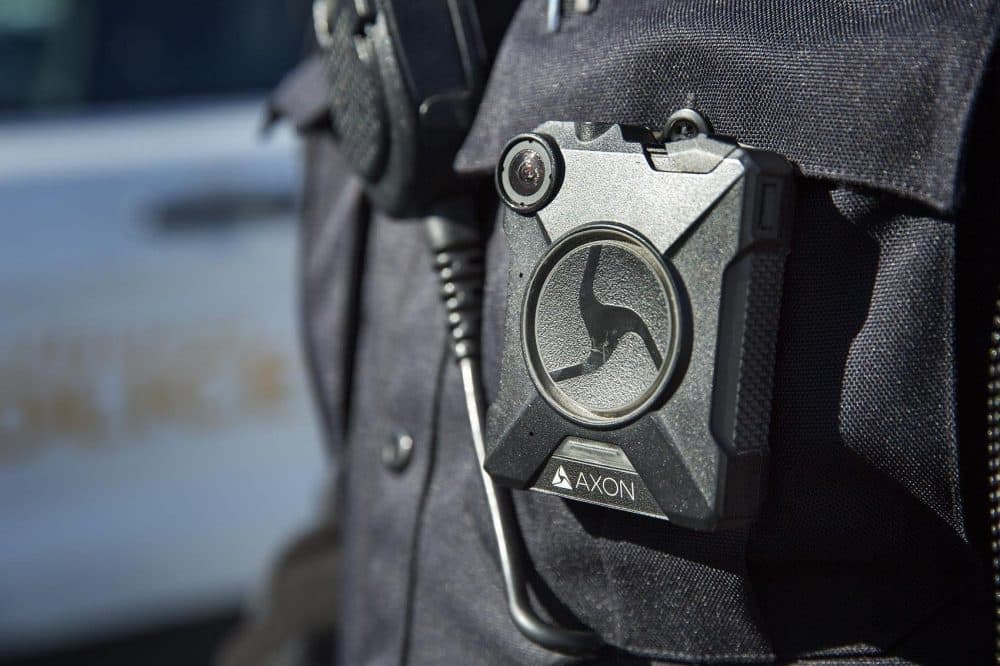Advertisement
Advocates Celebrate BPD Body Camera Rollout, But Say Policy Is Weighted Against Public
Resume
As of Monday morning, nearly 200 of Boston's roughly 2,100 police officers will be wearing body cameras as they go about their duties, a move officials say will improve relations between the department and community members.
Body cameras "reinforce the public's perception of police professionalism and preserve factual representations of officer-civilian interactions,” according to the BPD’s new policy.
Mayor Marty Walsh says he hopes body cameras will increase police transparency.
“Complaints against police officers in Boston [have] been down for the last five years," Walsh told WBUR on Sunday. "This isn't the answer to everything, but this is another piece of a very important process.”
But advocates in Boston say the policy doesn't go far enough to protect the privacy and legal rights of the public.
“According to this new policy, consent is not required at all, during any interaction, no matter where it is.”
Segun Idowu, co-founder of the Boston Police Camera Action Team
Under the policy, officers wearing the cameras are to record nearly all of their interactions with the public — unless they decide to stop recording, for example, at the request of a civilian or when a victim is giving their first account of a crime.
Though the policy includes guidelines for turning cameras on and off, officers will be allowed the discretion to operate their cameras as they see fit, with or without the consent of those being recorded, even inside a home.
Segun Idowu, co-founder of the Boston Police Camera Action Team, says his group has been lobbying for the policy to require that consent.
“Our policy called for consent, even on the street, but we were fine to accept notification on the street but consent in the home," Idowu said. "But according to this new policy, consent is not required at all, during any interaction, no matter where it is.”
Idowu says the body camera policy is weighted in favor of police in various ways — including that while officers get notified if their tape is distributed outside the department, civilians aren’t entitled to the same notification.
He also argues the officers' union — which initially was highly critical of the body camera proposal — had more say in the final policy than the community did.
"I understand [city officials] have to work with the union, but they don't have to abide by everything the union wants to do," he said.
Still, Idowu says the new policy "is something to build on" while body cameras spread across the rest of the department.
"For us it's going to be about changing it to make sure it reflects what people in the community wanted," he said.
“Oftentimes we just see little excerpts of [police business] and it doesn't fully tell the entire story."
William Gross, Boston police commissioner
Boston’s police officers can also benefit from the video footage, like in cases where an interaction is disputed. They will also be able to review footage before writing police reports.
Boston Police Commissioner William Gross says body cameras will give the public a better sense of what police deal with.
“Oftentimes we just see little excerpts of [police business] and it doesn't fully tell the entire story," Gross told WBUR.
"Wait until you see our video," he said with a smile. "You're going to be like, 'Wow, they are human!' ”
Gross says body cameras represent an inevitable technology that will benefit people on both sides.
“We went from a horse to a car, or a call box to a radio, and [handwritten] reports to computerized," he said. "Now everybody has cellphones and cameras anyway. Why not have an officer have that camera? That's going to protect the citizens; it's going to protect the officers.”
Monday's partial implementation of the body camera program is the beginning of a rollout that will eventually spread across the department. Advocates like Idowu are still waiting on details for how and when that will happen.
After five years of advocating for a universal police camera program, Idowu said he hopes the program is fully implemented soon.
“If this slow rollout is going to lead to full implementation, then we support it," he said. "We just hope it will happen a lot more quickly than 200 officers a year ... out of [2,100].”
This segment aired on June 3, 2019.
